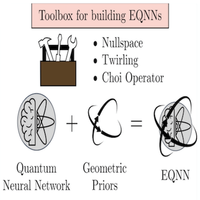Abstract
Quantum neural network architectures that have little to no inductive biases are known to face trainability and generalization issues. Inspired by a similar problem, recent breakthroughs in machine learning address this challenge by creating models encoding the symmetries of the learning task. This is materialized through the usage of equivariant neural networks the action of which commutes with that of the symmetry. In this work, we import these ideas to the quantum realm by presenting a comprehensive theoretical framework to design equivariant quantum neural networks (EQNNs) for essentially any relevant symmetry group. We develop multiple methods to construct equivariant layers for EQNNs and analyze their advantages and drawbacks. Our methods can find unitary or general equivariant quantum channels efficiently even when the symmetry group is exponentially large or continuous. As a special implementation, we show how standard quantum convolutional neural networks (QCNNs) can be generalized to group-equivariant QCNNs where both the convolution and pooling layers are equivariant to the symmetry group. We then numerically demonstrate the effectiveness of a -equivariant QCNN over symmetry-agnostic QCNN on a classification task of phases of matter in the bond-alternating Heisenberg model. Our framework can be readily applied to virtually all areas of quantum machine learning. Lastly, we discuss about how symmetry-informed models such as EQNNs provide hopes to alleviate central challenges such as barren plateaus, poor local minima, and sample complexity.
7 More- Received 5 February 2023
- Revised 10 March 2024
- Accepted 11 April 2024
DOI:https://doi.org/10.1103/PRXQuantum.5.020328
Published by the American Physical Society under the terms of the Creative Commons Attribution 4.0 International license. Further distribution of this work must maintain attribution to the author(s) and the published article's title, journal citation, and DOI.
Published by the American Physical Society
Physics Subject Headings (PhySH)
Popular Summary
Most currently used quantum neural network architectures have little-to-no inductive biases, leading to trainability and generalization issues. Inspired by a similar problem, recent breakthroughs in classical machine learning address this crux by creating models encoding the symmetries of the learning task. This is materialized through the usage of equivariant neural networks whose action commutes with that of the symmetry.
In this work, we import these ideas to the quantum realm by presenting a general theoretical framework to understand, classify, design, and implement equivariant quantum neural networks. As a special implementation, we show how standard quantum convolutional neural networks (QCNN) can be generalized to group-equivariant QCNNs where both the convolutional and pooling layers are equivariant under the relevant symmetry group.
Our framework can be readily applied to virtually all areas of quantum machine learning and provides the hope to alleviate central challenges such as barren plateaus, poor local minima, and sample complexity.



